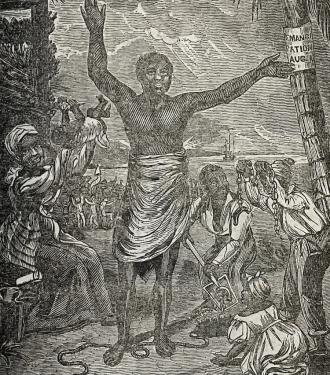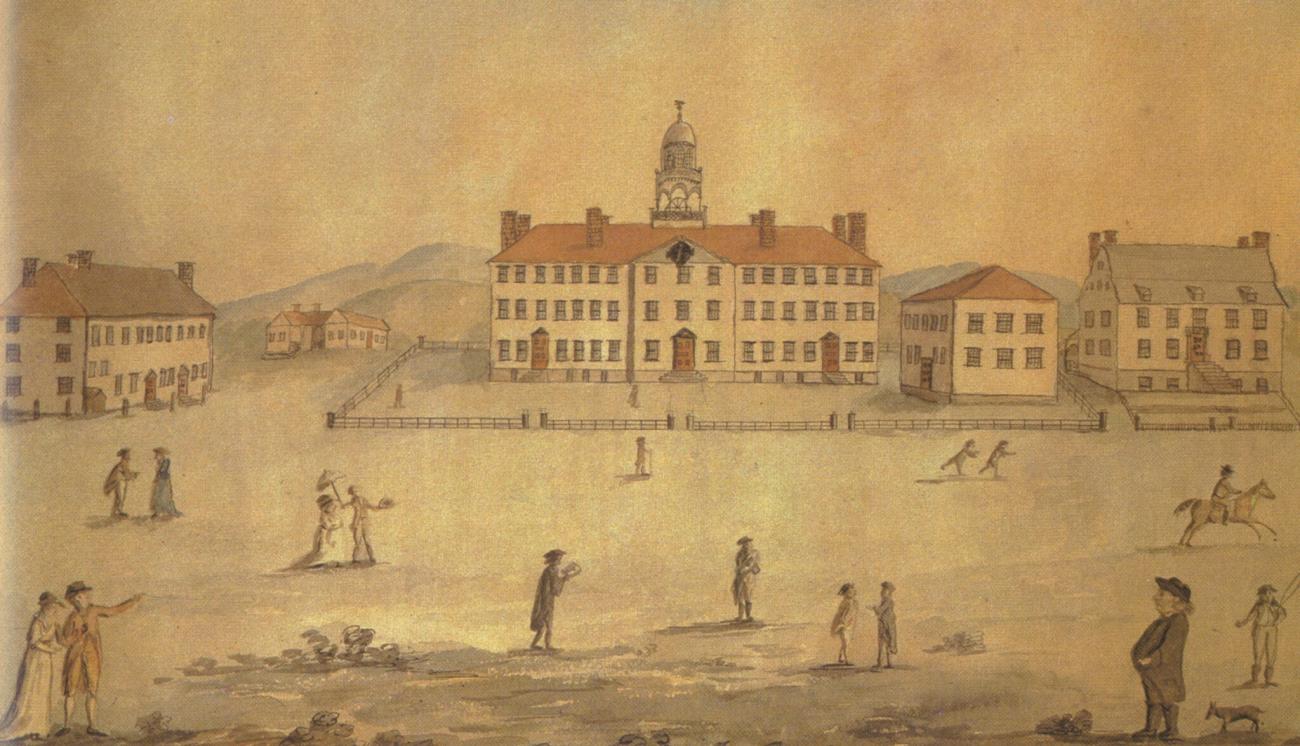The Dartmouth & Slavery Project is a critical interrogation of a public memory that celebrates the pine forests and mills dotting the college's New England landscape, while erasing their connections to the sailing vessels, cotton manufacturing, and sugar refining related to the transatlantic slave trade. The Project also challenges the notion of a "free" North versus a "slave" South by examining the lives of enslaved and free Black persons in New Hampshire and Connecticut; critiquing complex attitudes toward slavery, emancipation, abolition, and colonization; and uncloaking Dartmouth's complicity with and profits from the institution of slavery.
The origins of this project are rooted in a casual observation made in the mid-2000s by a former Dartmouth president, who remarked that — aside from its founder, Eleazar Wheelock owning a few slaves, and unlike Brown University and other Ivy League schools — Dartmouth's history had minimal engagement with slavery. Sociology Professor Deborah K. King found this assertion incongruent with New England's maritime history, the region's cotton mills, the routes northward to freedom that traversed its waters and mountains, and the political contestations over slavery and abolition. King assumed that a solid and forceful rebuttal was a task for a trained historian, but when no one volunteered, she took up the challenge.
In addition to undertaking her own scholarship, King wanted to educate and support Dartmouth students as they, too, initiated investigations into the college's ties to slavery. In Winter quarter 2014, "Lest We Forget: History, Collective Memory, and Slavery at Dartmouth" was offered as an advanced research practicum in Sociology, open to all students. The course had three major objectives: 1) to review the literatures on slavery in New England and in relationship to American colleges; 2) to examine the various approaches underlying similar projects at other institutions; and 3) to conduct primary and secondary research that would enable a contextualization of Dartmouth's history within those two scholarly trends. The students presented their preliminary findings at a public forum.
For the second offering of the course, in Fall 2018, the seminar members proposed, designed, and conducted a walking tour of the campus with more than 10 sites. The sites represented the students' research, including information on the activities of radical abolitionists and Dartmouth graduates Stephen Symonds Foster and Nathaniel Peabody Rogers. Foster and Rogers assisted Blacks in escaping slavery, and co-founded the coed, racially-integrated Noyes Academy in Canaan, NH, which a mob attacked and destroyed in 1835. Another site represented the American Colonization Society (ACS), which sought the removal of all free Blacks and emancipated slaves to Liberia, a U.S. colony in West Africa, and which, in 1840, counted 150 Dartmouth students and faculty among the members of its local chapter. Attention was also directed toward the lives of local Black residents, including the Jane Wentworth family. Born enslaved in Hanover, Wentworth worked for the College sweeping the chapel, and is buried in the Dartmouth Cemetery. Her son Charles B. Wentworth, and grandsons William Wentworth and Charles B. Wentworth, Jr., served with the Massachusetts 54th Colored Volunteers during the Civil War.
Meanwhile, in Rauner Special Collections Library, College Archivist Peter Carini had begun his own exploration of Dartmouth's record on slavery. Through an investigation of Eleazar Wheelock's account book and other papers, Carini discovered that, in fact, Wheelock had enslaved a significant number of individuals. From there, Carini employed those same documents in an effort to reconstruct aspects of their lived experiences. He shared these documents and analyses on the Rauner Library blog, along with more than 40 entries by other Rauner staff and Dartmouth students that looked into early Black graduates, as well as significant figures in the College's history who either articulated pro-slavery views—Daniel Webster, who supported the Fugitive Slave Act, for instance; or President Nathan Lord, who promoted a biblical defense of slavery—or, like U.S. Supreme Court Chief Justice Salmon P. Chase, were committed abolitionists. In observance of Dartmouth’s 250th anniversary, Rauner's Hindsight is 20/19 podcast series featured several slavery-related episodes.
In the Fall of 2019, King's and Carini's efforts came together as students in King's seminar curated, under Carini's and King's guidance, a library exhibit tied to the College's 250th anniversary. "The Ties that Bind: Slavery and Dartmouth" explored the lives of those who were enslaved by the college's first two presidents, as well as the college and its Hanover, NH, home as a site for the intellectual, moral, and political debates surrounding slavery. The exhibit themes were: "Slavery during Dartmouth's Founding Early Years," "Dartmouth and the Debates on Slavery," and "'Slavery is what it is; and it is nothing else'—Nathan Lord.” (The "Ties That Bind" exhibit is now available digitally.) The collaboration between Professor King, Carini, and Library staff initiated a larger discussion about Dartmouth's need to better understand its role in slavery and to come to grips with a more complete and accurate narrative of its past. From these discussions, the Dartmouth & Slavery Project was conceived, and, in July 2020, formally begun with Carini and King as co-directors. In December 2022, the Project received its first institutional funding from the Division of Institutional Diversity and Equity. The digital collection Enslavement Documents from the Wheelock Collection became publicly available in April 2023.
Project Credits
Project Co-Directors
Peter Carini, College Archivist and Records Manager
Deborah King, Associate Professor of Sociology, Emerita
Research Assistants
Alexis Chelle '25
Paul J. Hudson '23
Timothy Lenoch, Research Outreach Coordinator for the Dean of the Faculty
Julia Levine '23
Editor
Hazel-Dawn Dumpert
Website Design
Laura Braunstein, Head of Digital Scholarly Engagement
Leonee Derr, Library Communications Manager
Leanne Litsios, User Experience Designer
Este Pope, Manager of Digital Scholarly Software & Systems
Joshua Shaw, Library Web and Application Developer
Campus Walking Tour Application Developer
John P. Bell, Digital Humanities Informatics Specialist

Illustration from Julius Rubens Ames, The legion of liberty! And force of truth, containing the thoughts, words, and deeds, of some prominent apostles, champions and martyrs, New York, 1844.
